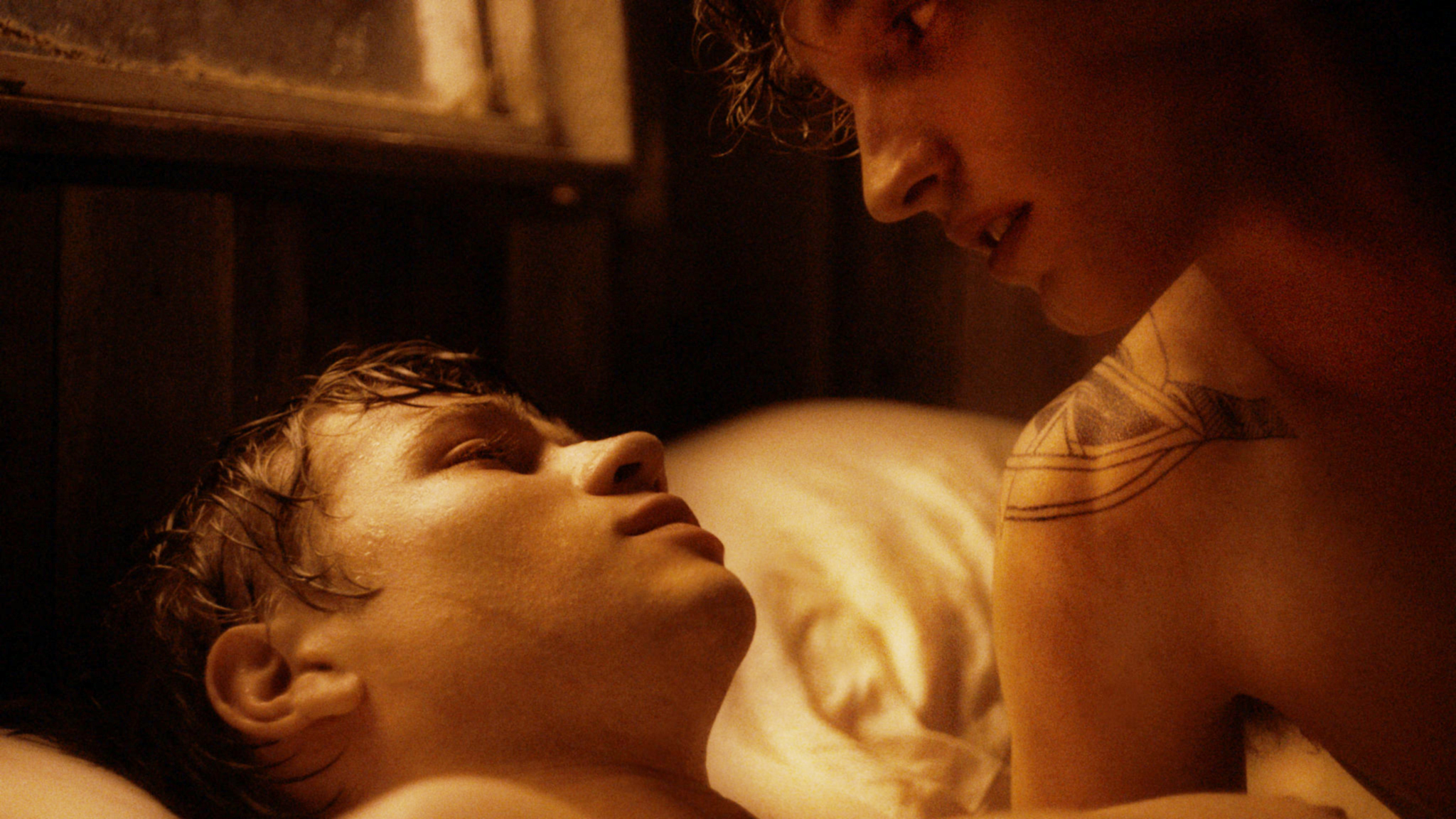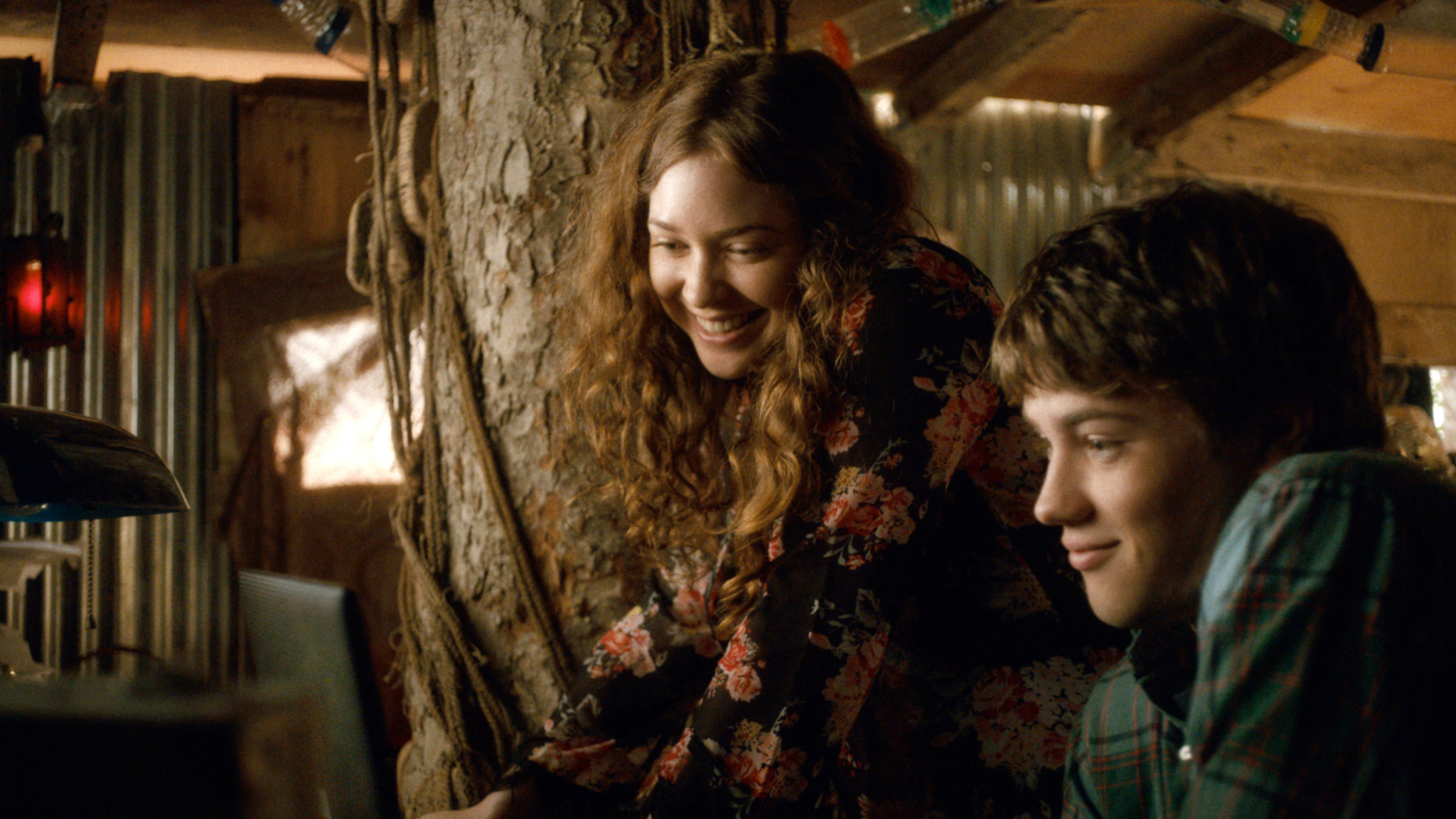Dysfunctional parents, a pining girlfriend, falling for a straight guy — if you’ve seen one gay coming-out movie, you’ve seen them all. In fact, the genre has become so overcrowded that it’s spilled out from indie film festivals to streaming and even the multiplex via mainstream efforts such as “Love, Simon,” “Heartstopper,” and “Red, White & Royal Blue.”
Watching these same beats play out time and again, it’s tempting to dismiss coming-out movies as trite or unnecessary these days, at least within a Western context. But of course, every generation deserves its own version of this story. The problem is when said story is derivative of what’s come before.
Cookie-cutter takes on this vital step in the lives of so many no longer move the dial forward like they used to. To be queer is by definition a radical act, yet subversive, disruptive spins on that narrative remain few and far between.
Ten years ago, Stephen Dunn thankfully defied that trend with his debut feature, “Closet Monster,” which actually brought something new to that well-trod journey of self-discovery.
We’re first introduced to Oscar Madly (Jack Fulton) around the age of seven just as his mother Brin (Joanne Kelly) ends her marriage to Peter (Aaron Abrams), leaving their son behind with only a pet hamster for company. Not long after, Oscar walks through a graveyard near school one day, acting out his favourite TV show, when he comes across an unspeakable hate crime playing out right before his eyes.

Oscar can only watch in horror as a group of older bullies viciously beat a kid up before paralyzing him with a metal rod shoved in from behind. His TV heroine, Buffy the Vampire Slayer, is nowhere to be seen, and with just a toy stake in hand, Oscar can’t save the day, either. Later that night, still disturbed by what he saw, Oscar watches a news report with his father, who confirms the attack was likely homophobic and jokes, “That’s why you’ve gotta get rid of this hair, buddy.”
Ten years on, 18-year-old Oscar (Connor Jessup) channels this nightmare ordeal into the fantasy world of monster makeup, creating scary imagery of his own in an unconscious bid to take back control of his trauma. Aspiring model Gemma (Sofia Banzhaf), who regularly poses for Oscar’s photos, also aspires to be his girlfriend, but something seems to be holding him back. As he waits to find out if he’s been accepted into a special design academy, Oscar whiles away his days working at a Home Depot store where he meets Wilder (Aliocha Schneider), the kind of elusive, sexually ambiguous hottie that gay kids typically fall for in these films. Except, Dunn’s writing is far from typical.
The pair first starts talking in the locker room when Wilder asks to borrow Oscar’s work shirt. He doesn’t mind that it’s sweaty. In a later shift, Oscar gets the shirt back and smells it in private, taking in the scent of Wilder now mixed with his own. Quickly overcome by the immediacy of lust and teen horniness, Oscar goes to a private cubicle and huffs the shirt like meth, practically choking on the smell of their combined sweat as he starts to touch himself. But then the scene switches gears in the worst way possible.
As Oscar’s imagination brings him close to climax, unwanted memories of that awful day suddenly puncture his thoughts, pushing images of Wilder into the same cemetery where a boy was horribly violated. Oscar looks down then, not in his mind, but in actual reality, where he sees that same metal rod now inside him, pushing out of his own flesh.
The vision ends as quickly as it began, and so does Oscar’s horniness along with it. His experience in the cemetery that day has now become inextricably intertwined with his own burgeoning sexuality, just as his and Wilder’s sweat became one in the shirt that led to this moment.
Dunn’s script is less interested in the initial realisation of queerness than it is in the pain of living an inauthentic life. And the horror of denying oneself is never more visceral than when “Closet Monster” visualizes that trauma in the form of Cronenbergian guts and gore that twist the flesh. As the film continues, these surreal scenes of grotesque body horror continue to disrupt the more standard coming-out narrative in unexpected moments that equate queer desire with something tangibly monstrous.
Many people — too many people — intimately know the impact shame can have on nascent queerness and sexuality, yet it’s hard to think of a film that better depicts the disgust and self-loathing that often accompany it. Despite the film’s coming-out framework, it’s not out of place to see Oscar throw up pieces of metal after sex or even pull a bloodied rod out of his stomach in the film’s most harrowing moment. It’s to Dunn’s credit that these nightmarish sequences fit so organically because getting to grips with your queerness is supposed to be a bit weird and scary, yet this key aspect is all too often overlooked or sanitized in a bid to make coming-out stories more “palatable.”

It’s not just through horror that “Closet Monster” gets freaky. In the film’s calmer moments, when Oscar finds refuge in his room, he regularly shares intimate talks with his pet hamster, who is, of course, named Buffy. And Buffy talks back, giving advice and pearls of wisdom that bring comfort to Oscar at a critical juncture in his life. It’s never explained how a hamster can talk, or whether or not these conversations that Buffy shares with Oscar are actually real. And, crucially, it’s never explained why said hamster is voiced by Italian screen legend Isabella Rossellini in one of her best, weirdest roles in a career full of them.
But none of those questions really matter, which speaks to the charm and nimble play of Dunn’s script. What does matter is how Rossellini’s Buffy embodies the sweetness of a sensitive boy who just needs tenderness and someone to talk to. Oscar’s self-proclaimed “spirit animal” also brings some much-needed levity through pearls of wisdom and surprise one-liners that Rossellini delivers like no one else ever could. “It’s been 10 years. Your parents replaced me, like, four times,” is an all-timer, especially.
This dreamlike merging of horror and camp wouldn’t work as well as it does if the coming-out story that ties it all together wasn’t successful, too. Thankfully, “Closet Monster” would still be worth watching even if the genre elements were toned down or removed entirely. Dunn clearly loves the tropes he’s deconstructing here, and as such, the chemistry Jessup and Schneider share increasingly tender scenes as engrossing as any you’d find in the best coming-out films. It’s Dunn’s assured confidence in weaving these elements together that makes “Closet Monster” so impressive, however, with each building on the other to help us further understand and root for Oscar even more.
After making its debut at the Toronto International Film Festival — where it won the award for Best Canadian Feature in 2015 — “Closet Monster” didn’t inspire an immediate wave of similar stories. (Strand, perennial distributor of queer films, released the movie stateside in 2016.) However, its DNA can certainly be felt still in queer genre-bending films like “Swallowed” by Carter Smith and Jane Schoenbrun’s “I Saw the TV Glow” (as well as 2017’s “Super Dark Times” in tone, if not sexuality).
Dunn himself has also continued working in a similar vein on the small screen, first in his web series “Pop-Up Porno,” which depicted embarrassing dating stories in picture-book form, and then through his ambitious 2022 reboot of “Queer As Folk.” Not only did the original(s) help an entire generation of gay men reckon with their sexuality on both sides of the Atlantic, the UK version just so happened to feature one of the most radical coming-out speeches of all time.
“I’m a poof, a poofter, a ponce, a bumboy, a batty-boy, a backside artist” (and more) declared Stuart to his astonished parents at a time when being closeted was still the norm for an unfortunate majority. 22 years later, Dunn’s reboot revelled in the freedom that earlier coming out stories like this helped forge, all while moving the dial forward again with a more inclusive definition of who “queer folk” are in the 2020’s.
As such, coming out stories still matter, but they too need to adapt and evolve to encompass what queerness looks like now, all these years after classics like “Beautiful Thing” and “But I’m a Cheerleader” first showed us what was possible. As Dunn proved in his singular debut, unique coming out stories such as “Closet Monster” still have the capacity to surprise and resonate beyond the usual narratives we’ve seen a thousand times before, even if examples of that can be rare to find still, 10 years on.



